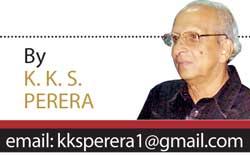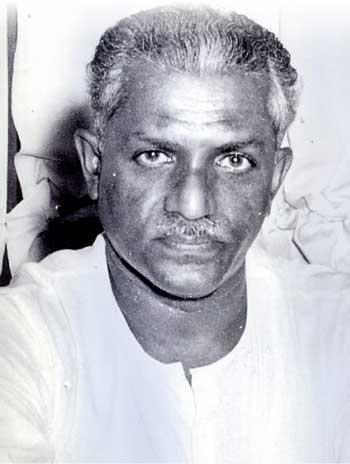Reply To:
Name - Reply Comment
 “Philip was a towering political personality, a fiery charismatic energetic visionary, whose brilliant mind often raced far ahead of his comrades”
“Philip was a towering political personality, a fiery charismatic energetic visionary, whose brilliant mind often raced far ahead of his comrades”
- Charles Wesley Ervin:
Authority on the Trotskyist movement
Fourteen-year old schoolboy Philip with his mother travelled in a horse-carriage, straight into Queen’s House, and presented a petition to Governor Robert Chalmers, who promptly released his father, Boralugoda Ralahamy who was sentenced to death, tyrannically imposed on national leaders during the martial law of 1915, by the colonial rulers.
Gaining admission to the Universities of Illinois and Wisconsin in the USA initially, he read Economics and finally passed out from the Colombia University with a doctorate in agricultural Economics. As an undergraduate Philip Gunawardena joined the struggle of anti-imperialist league in the US. Becoming an active member in it, in 1929 he moved to the UK and joined rebellious students like Jawaharlal Nehru, Jayaprakash Narayan of India and Jomo Kenyatta of Kenya. In early 1930s, avoiding security checks he who crossed the Pyrenees range of mountains the natural border between Spain and France that reaches a height of 3,400m at the peak, by himself on foot carrying a bundle of secret documents for the Spanish revolutionary movement.
 Philip became a regular speaker in Hyde Park Corner, where he attacked the Imperialists and the conservatives. Once the British government impounded his passport and it was Minister for Home Affairs Sir Baron Jayatilleke, who intervened and got it released. Philip returned home in 1932. In 1936, at State Council election he was elected a member for Avissawella defeating the Speaker Forester Obeysekera. The LSSP advocated for Swabasha that the Administration of the country should be in Sinhalese and Tamil. Consequent to that attitude Philip, as a member of in 1936 he introduced a motion in the State Council that the work in Municipal courts and police courts should be conducted in the vernacular, in Sinhalese and Tamil.
Philip became a regular speaker in Hyde Park Corner, where he attacked the Imperialists and the conservatives. Once the British government impounded his passport and it was Minister for Home Affairs Sir Baron Jayatilleke, who intervened and got it released. Philip returned home in 1932. In 1936, at State Council election he was elected a member for Avissawella defeating the Speaker Forester Obeysekera. The LSSP advocated for Swabasha that the Administration of the country should be in Sinhalese and Tamil. Consequent to that attitude Philip, as a member of in 1936 he introduced a motion in the State Council that the work in Municipal courts and police courts should be conducted in the vernacular, in Sinhalese and Tamil.
Though he believed that social development basically should stand on scientific lines of Marx-Engels, unlike his contemporaries he was not a blind follower of ideology. He always maintained links with native cultural roots. The eloquent speaker, Philip Gunawardena displayed his debating expertise in parliament and overpowered his opponents and appraised every Bill before it went into the Statute Book. With sympathy towards the depressed, under privileged, and the oppressed masses, he used every opportunity to take steps to liberate the poor from the shekels of poverty. He also transformed the co-operative movement expanding its range to multiple services.
He was imprisoned together with NM, Colvin and other Samasamajist leaders in 1940 for the party’s stand on WW II. It was his younger brother Robert, with the help of Jailer Solomon who organised the famous Jail-break in 1942. They escaped to India taking a hazardous, journey across the Palk Straits. They were hiding in India shortly before the Indian authorities caught them and jailed in India.
Philip was a great force behind the 1956 people’s victory and the fall of the elitist class. He was a Trade Union leader and a great lover of people who fought for a just society where everyone enjoyed equal benefits. His political thinking was fashioned by leading many trade union battles in US.
Paddy Lands Act
One of the main triumphs of Philip Gunawardena, Minister of Food Agriculture and Cooperatives was the Kumburu Panatha[Paddy Lands Act] in 1958 that gave security of possession to the tenant cultivator who toiled on the fields and was forced to part with half the crop to the landowner, whose task was only to hold on to the deed. The cultivator was given a guarantee of the contract by State plus a three fourths share of the crop. which obviously the land-owners hated. There was severe resentment from a powerful section in the government too. However, a watered-down Act finally got through the Parliament making a huge social change.
Guaranteed Price Scheme for Paddy
He introduced a Guaranteed Price Scheme for Paddy in March 1958. Speaking in the house amidst interruptions and heckling from both sides, he stated,
“I want to make it quite clear that my ministry at no stage contemplated reducing the guaranteed price. The order merely set out the manner in which the payment was to be made. We decided that it should be Rs. 10 in cash and Rs. 2 in kind, purely for the purpose of developing production which would be of greater benefit to the cultivator and more in with his interest than the payment of full 12/- . They lose the money before they go home. I like to help him save at least a portion of what he has realized from his crop for the next cultivation season.
Somehow or other we must stop this annual drain of Rs. 260 million that is sent out of the country for purchase of rice. I wish to refer to a regrettable incident that took place this morning in front of Senate House, Gordon Gardens brought about by interested parties, largely black marketeers helped by the Ven. Buddharakkita of Kelaniya temple. I saw him with my own eyes leading the demonstration. It is regretted that some people who should not have taken to robes, brawny men, somewhat sexy in their appearance who make an appeal to the elegant ladies.
If there is a government contract going, one finds Buddharakkita and his agents hovering about like hungry jackals. …the political life of this country should be cleansed of these people. We were elected to serve the poor people of this country and we are not going to be intimidated or bullied by anybody however great he may be. So far I am concerned, I serve this government because I feel that I can translate into action some of the things for which I have been working for 20 or 30 years and as long as I am permitted to do that I will continue.
The guaranteed price will continue.” --Hansard - May 6, 1958
Unlike his Marxist colleagues, NM and Colvin, Philip Gunawardene derived insight from both Marxism and Sinhala nationalism, local culture and it was in this context that he differed with the traditional Marxists. He advocated the abolition of Headman system as he was convinced that it oppressed the village peasantry. It was his speech on the Headman system which influenced his own father, to submit his resignation from the post of Vidane-Aratchi.
Criminal Defamation Case: Sydney de Zoysa Vs Philip G.
Minister Gunawardena exposed the senior DIG range 2; Sydney de Zoysa as conspirer against the government, at MEPs May Day rally in 1959, and insisted PM Bandaranaike to remove the Police officer cum the brother of his cabinet colleague and minister of finance Stanley de Zoysa. The Attorney General told court that there is a prima facie case against the minister. Sydney, a member of powerful de Zoysa family sued him over this issue. In a land mark judgment the court held that Philip as a responsible minister had accomplished his rightful authority in cautioning the PM of an impending threat. The bench delivering the judgment made a comment on the honesty and truthfulness of the Minister which Philip uttered in response to cross examination by Sydney’s lawyers. The District Judge who heard the defamation case dismissed it and declared that Philip was an epithet of truthfulness and integrity.
However, Philip had to leave the cabinet and government when 10 right wing SLFP ministers waged war against him. Three months later Buddharakkita conspired and assassinated the Prime Minister. Sydney de Zoysa’s name transpired in the assassination investigations that were carried out. Sydney was sent on compulsory leave. Three and a half years later, on January 27, 1962, Sydney DIG [Retd] was arrested, convicted and sentenced for his role as a leader in the aborted Coup de’ tat against Sirimavo’s democratically elected administration. Philip the staunch Trotskyite who introduced Marxism to Sri Lanka ultimately decided to join hands with Dudley Senanayake in 1965 and served as the Minister of Industries and Fisheries in the National government under Dudley until they lost to UF coalition in 1970.
Philip Gunawardena was a man of courage. He was not a racist or communalist, but a true patriot. Instead of accumulating wealth he sacrificed what he inherited as ancestral wealth. Philip and Kusuma were blessed with five children eldest was Indika, as he was born in India, who became Minister of Higher Education, Dinesh-Minister,Gitanjana ex-MP, Prasanna, Mayor CMC and Lakmali [the writer, poet].
He was devoid of racism, deceit, religious bigotry, casteism, cowardice and opportunism. Philip devoted his time and means for the progress of the downtrodden masses. He detested injustice and struggled to establish truth, justice and fairness.
“In the years to come, when lesser Mortals like us have played their evanescent part and vanished into limbo of forgotten, a grateful socialist of Ceylon would remember Philip Gunawardena with pride and place him on the worthy pedestal due to him. History will no doubt accord him his rightful place in the political life in the country.” -- Dr. N. M. Perera
Philip Rupasinghe Gunawardena, A political colossus, a great statesman, and a man of providence who changed the course of history in this land, left an unforgettable image in the political history of Sri Lanka as an excellent representative of people and as a statesman par excellence. Quite unexpectedly he fell ill and passed away on March 26, 1972 at the age of 71 years.
In early 1930s, avoiding security checks he crossed the Pyrenees range of mountains the natural border between Spain and France that reaches a height of 3,400m at the peak, by himself on foot carrying a bundle of secret documents for the Spanish revolutionary movement